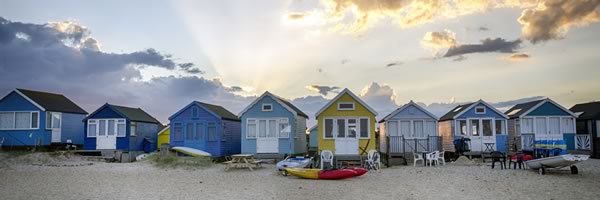Updated: August 2022
Contents
Introduction
Ever stuck for holiday ideas? Planning a weekend break, but not sure where to go? Then maybe you are thinking about buying your very own holiday home?
Or, perhaps, maybe you are thinking about the benefits of investing in your own holiday home in the UK?
Whatever the reason, this brief guide is intended to help focus your thoughts on just that by looking at:
- some of the reasons for buying a holiday home in the UK;
- whether or not you plan to let out your second home to paying guests;
- where might you be looking to buy?
- how to finance the purchase of a holiday home;
- insuring your second home;
- obligations and responsibilities to keep in mind if you are planning to let your home; and
- tips on marketing a holiday let.
No short brief can claim to be exhaustive, of course, but your thoughts along these lines might help to start the ball rolling. Please also note that the information within this guide is based on our current understanding of the law. As the law can change, however, we recommend you seek professional advice if there are any aspects of owning a holiday let that you are unsure of.
Why buy a holiday home?

Your home may be your castle, but that doesn’t mean you want to live in it the whole year round, from one day to the next, without at least some breaks away – if only to remind yourself just how important your main home might be.
In no particular order of importance, here are some reasons, then, for investing in a second or holiday home:
- it might offer a big step in helping to fulfil your dreams – a place you might have set your heart on for years;
- if you own a second home, you might never be stuck for holiday ideas again – there is always somewhere to go and relax, whether for your principal holiday of the year or simply for those all-important weekend breaks;
- a holiday home is your second home, a home away from home – somewhere you can decorate and furnish to suit your own tastes and keep there all the things that may be important for enjoying a holiday or break away from where you live the rest of the year;
- it might be that special place where you may spend some quality time either with your partner or for re-establishing those important bonds with your children;
- a holiday home might offer an escape and refuge from the cares and worries of what may be a busy and fraught working life;
- a second home may provide an alternative and interesting venue for entertaining friends and family – with the option of being able to put them up overnight if the occasion demands;
- depending on your choice of location, a second home might give you a valuable opportunity to test out a likely area for your eventual retirement – before you up sticks and finally commit to the home and the area in which you want to retire;
- as a second home, you are unlikely to be using it throughout the year, so when you are not in residence, there is always the opportunity of letting the accommodation and earning a useful income into the bargain.
Any purchase or investment we make of course reflects our personal tastes and preferences. To the reasons given above, therefore, you might well have many of your own to add.
To let or not to let?
When considering becoming the owner of a second or holiday home, you might be asking yourself the pros and cons of letting it out to paying guests.
Unless you are particularly commercially minded, you might find the idea strange at first to let strangers into your second home – albeit that they are paying you rent for the privilege. Those feelings of uncertainty may be quite understandable.
Some of the more common considerations may be:
- how many weeks are available for lettings – it is entirely up to you, of course, to fit in as many or as few weeks as you choose, taking into account your own and others’ demands during peak seasons such as school holidays and access to the beach, for example, during the summertime;
- will total strangers look after my holiday home – to minimise the risks of other people failing to respect and take care of your property it is important that you take a deposit against the possibility of breakages and other damage, and make sure to have a formal written lettings agreement drawn up;
- some of the contents of your second home are of special value to you – if you have items of particular sentimental or personal value, consider locking these away in a secure cupboard or even a separate storage room in your holiday home;
- lettings, cleaning and managing changeovers sound like a lot of work – indeed it might be, but there is no need to take on the whole job yourself. Specialist lettings agents are experienced in managing the whole process on your behalf and it is largely a question of how much you want to take upon yourself and how much you are prepared to pay an agent;
- how much rent may be charged – how much you actually charge your short-term tenants of course depends on what the market is likely to bear. The kind of holiday home you own, its location and the season or seasons you are offering it for rent are all factors affecting the rent you might charge. You might take a tip from what other property owners in the area may be charging for holiday lettings at different times of the year;
- tax implications if you decide to let your holiday home – different rules apply depending on whether your holiday let is furnished or not.
Letting your holiday home might offer a great opportunity for earning extra income when you are not using it. If you are new to the lettings business of course you might have some concerns, but the majority of these might be easily addressed.
Considerations when choosing where to buy your second home

Location, location, location – the cliché applies just as much to choosing where to buy your second home as any other property. In the case of a holiday home, however, there might be some additional, important considerations likely to make or break your decision to buy:
Know the area
- you are unlikely to buy a holiday home in an area you have not already visited and spent some time getting to know your way around. But the purchase of property is a relatively long-term investment and you might want to reassure yourself, therefore, that the area you choose is one that you – and any paying guests – might want to return to again and again, at various times of the year;
- you might already have fallen in love with the area, but if you are looking to make the most of the property’s potential for holiday lettings, are you sure that others are going to feel more or less the same way about the location;
- some locations are likely to have a distinct seasonal appeal – those close to beaches during the summer, for instance – especially those that coincide with school holidays;
Price
- how much you are going to pay for your holiday home of course depends on your budget, the type of property you are interested in buying and its location;
- even within the same area, there may be quite wide variation in property prices – in seaside locations, for example, those right on the beach front are likely to command considerably higher prices than those set back just a street or so away from the sea;
- local estate agents, of course, are well placed to advise about the prevailing market rates in a particular area, or you might want to use the internet to browse possibilities from the comfort of your own home – some websites specialise in the market for second / holiday homes;
Distance
- the distance from your principal home is likely to be a major factor, whether you are proposing to use your holiday home mainly for yourself or for letting out to others;
- if it is for your own use, for instance, you might want to strike the right balance between it being away from home, yet not so far that you need to spend hours driving to it – the last thing you are likely to want for a weekend break is several hours of driving, especially in heavy traffic;
- if the principal use of your holiday home is a lettings investment, the distance from your own home might be less critical, although the closer it is, of course, the easier it may be to take on the management of the lettings business (rather than paying an agent to do it all for you) and generally to keep an eye on the place.
Where you choose to buy your holiday home of course depends on a whole host of personal preferences, but some considerations might be especially important if you are hoping to maximise the lettings potential of your second home.
Financing your second home

Probably the first place you are likely to turn when thinking about financing any purchase of a second home is a mortgage lender.
Arranging such an advance for the purchase of a holiday home raises some interesting questions about mortgages and the use to which a property is going to be put:
- on the one hand, is it a standard home mortgage, arranged for the buyer who, together with his or her family, intends to be the one and only owner occupier. The affordability of the mortgage is assessed by the lender on the basis of the income from employment of the home owner;
- on the other hand, is it a buy to let mortgage, arranged for the landlord committed to running a business by letting the property to tenants. Affordability is based on the lender’s assessment of the rental yield – namely the income from rent, less the cost of owning the property and running the buy to let business.
A mortgage for a second home that is to be occupied by the owner for some parts of the year and let to tenants at other times, therefore, falls between the two different use classes recognised by mortgage lenders – your capacity for borrowing depends on your income, yet there may also be a rental yield from holiday lettings.
Second mortgages
The type of mortgage you may be offered by a mortgage lender and the terms and conditions attaching to it may vary from one lender to another.
The most common form of second mortgage is to the homeowner wanting to purchase a holiday home principally for their own use, but for the occasional letting out to tenants. Because it is let on an occasional basis, it is not possible to calculate the rental yield in the same way as a formal buy to let mortgage requires.
A second mortgage, therefore, may lie somewhere between one for an owneroccupier and one for a buy to let landlord – but leans more closely to the former.
Seeking specialist advice from an expert in the field may help. This is because if you get the ‘wrong’ type of mortgage for your property – for example, you get a residential mortgage for the second home that you then let out – your mortgage lender can demand you repay the outstanding mortgage balance immediately.
You could also face charges of fraud.
Insuring your second home

Wherever you have bought your holiday home and whatever type of property it might be, you have probably invested a considerable sum in its purchase. Protecting the property with comprehensive insurance, therefore, is likely to be given high priority.
You may also typically find that having adequate buildings insurance may be a condition of any mortgage agreement you have relating to the property.
Insurance for your second home is a subject in which we have a particular expertise and experience here at Cover4LetProperty – so feel free to contact us to discuss any concerns you might have about this important aspect of owning a holiday home.
Perhaps the most important fact to keep in mind is that an insurer’s principal concern is the risk of loss or damage to the insured item. In assessing those risks, the insurer needs to know the use and purpose to which the property is to be put.
It is important to make clear from the outset, therefore, whether your second home is a holiday home for you and your family only, or one that may be let to temporary tenants.
Building insurance
- probably the most important element of insurance for your holiday home is the building insurance designed to safeguard the structure and fabric of the property against such major risks as fire, flooding, storm damage, impacts and vandalism;
Contents insurance
- also at the heart of insurance for your holiday home is the insurance of its contents, including the risk of accidental damage – and for periods during which it is let to tenants the risk of any malicious damage caused by them;
Empty property insurance
- insurance for a holiday home also needs to recognise that the property may be left vacant and unoccupied by potentially extended periods of time – and the heightened risks to which such an empty property is likely to be exposed;
- the terms of any such cover invariably rely on your playing your own part to mitigate the risks of loss or damage and may require you to take more than usual security measures, maintain the property in a sound state of repair and arrange regular inspections whilst it is empty;
Public liability insurance
- this is especially important during those times when you have guests – friends, relatives or paying tenants. If any visitor, tenant or member of public suffers a personal injury or has their property damaged in connection with your holiday home, you may be held liable and ordered to pay what might be substantial compensation;
- public liability insurance – which may also be likened to landlord liability insurance – provides the necessary indemnity against such claims and typically extends at least £5 million or more of cover.
Whether you and your family are the principal users of your second home or whether holiday lettings are an essential reason for your investment, insurance plays a critical role in safeguarding your property.
Obligations if you are letting your property
You might be only an occasional or accidental landlord, but whenever you choose to let your holiday home, there are a number of important obligations and responsibilities that your role assumes.
Your general responsibility under common law for a duty of care towards, visitors, tenants and members of the public has already been mentioned. In addition, statutory law imposes a number of additional requirements to ensure the health and safety of tenants:
- gas safety – an annual inspection is required to ensure that gas supplies and all appliances are safe and in good working order. Inspections must be made by an approved Gas Safe registered engineer, whose report must also be made available to your tenants;
- electrical safety – the law varies depending on where your property is in the UK, but typically, 5 yearly checks by a qualified professional are required, plus 6 monthly visual checks. Health and safety regulations also require you to ensure that all are in safe, good working order;
- fire regulations – you also have a general responsibility for ensuring that national and local fire safety regulations are adhered to;
- carbon monoxide detectors and fire alarms – more legislation also requires landlords to install and regularly check carbon dioxide detectors and fire alarms;
- Energy Performance Certificate (EPC) – any landlord already needs to make a copy of the building’s EPC available to tenants, but since April 2016, all landlords, including accidental landlords, need to improve the energy efficiency of any premises currently graded F and G to at least the standard of an E rating. Further reading here.
Whether or not you are no more than an occasional or accidental landlord, therefore, a number of laws and regulations impose conditions to which you must comply – on pain of hefty financial penalties.
Marketing your holiday let

If you decide to let your holiday home, it is important to have a grasp of at least some of the more basic marketing skills in order to ensure that you realise the full potential of the property.
There are a number of self-help guides to marketing a holiday let. Some of the key considerations may typically include:
- care and attention when creating your advert or listing – especially with respect to an eye-catching headline;
- the accuracy and detail you include in the description of the property;
- the importance of show-casing your holiday home with well-taken photographs;
- making the most of the facilities and amenities offered by your particular holiday home;
- information about the surrounding area; and
- last but not least, making sure that your rental rates are clearly and unambiguously set out in any advertisement or listing.
Taking on this marketing job alone, let alone all the other details of managing the letting of your holiday home, may prove onerous indeed. You might save yourself much of the time and effort – though reduce your effective rental income – by employing letting agents to take on the job on your behalf.
Summary
Buying a second or holiday home might mean that you are never stuck for holiday ideas again. It could also be the place you retire to.
Choosing your location and property carefully may help to ensure that you do not tire of going back to the same place time and again – since there are plenty of advantages that a holiday home may bring, provided you also take care to keep it adequately insured.
There may be opportunities for earning an income from holiday lettings, although you need to be aware of the responsibilities and obligations that go with being even a casual, occasional or accidental landlord.







